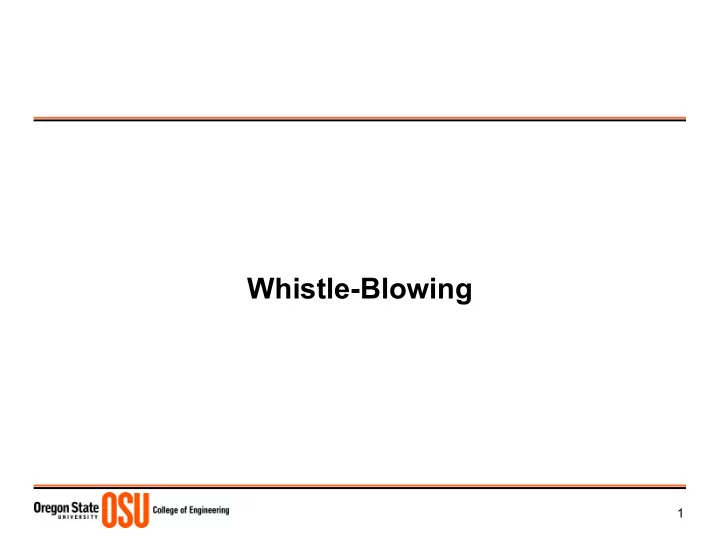

Whistle-Blowing 1
Whistleblowing ● Disclosure, using other than approved organizational channels, of wrongdoing to someone in a position to take action. ● disclosure: information intentionally conveyed ● channels: chain of command, organizational hierarchy, etc. ● wrongdoing: significant moral/ethical problem for the organization (e.g., public danger, illegal acts, unethical policies/practices, injustice, etc.) ● discloser: employee, perhaps former employee, perhaps someone closely associated with the organization ● recipient: someone who can do something about it (e.g., government official, news media, high-level official in organization, etc.) 2
Types of Whistleblowing 1.External whistleblowing ● information goes outside organization 2.Internal whistleblowing ● information remains within organization 3.Open whistleblowing ● discloser/agent identifies him/herself 4.Anonymous whistleblowing ● discloser/agent remains anonymous 3
Whistleblowing: Examples From Text 1. Ernest Fitzgerald: USAF cost overruns 2. Daniel Applegate: DC-10 floor/hydraulics (whistle “swallowed” by Convair/Douglas Aircraft 3. Virginia Edgerton: NYPD/prosecutor's software 4. Roger Boisjoly: Challenger disaster (NPR story) ● Cautionary reports (internal, before disaster) ● Report to Rogers Commission (external, after disaster) 5. Holger Hjortsvang, Robert Bruder, Max Blankenzee: BART ● Internal memos (unsafe train control, poor testing) unheeded ● Anonymous memo to management ● Information to BART's board of directors ● Engagement of private consultant who corroborated ● Release of anonymous memos to press by director ● Engineers “vindicated” but punished 4
Motives For Whistleblowing ● Why blow the whistle? ● Is whistleblowing always justified? 5
Whistleblowing: Other Examples 1. Kermit Vandivier, technical writer: BF Goodrich A7-D brake tests ● Forced against his will to falsify test reports for brake to “meet” USAF specifications. ● Later resigned, then reported, eventually to Sen. William Proxmire. 2. Joseph Carson, PE: DOE inspector, Oak Ridge nuclear facilities ● Over 13 years reported cases of fraud, waste, abuse, violations ● Remained with DOE, but reassigned, suffered illness, stress ● DOE had to pay legal $400,000 legal expenses ● Carson cautions engineers on whistleblowing 6
Whistleblowing: Other Examples 3. William Cor, glovebox specialist: Los Alamos ● Reported concerns over leaks, need for more testing ● Leaks: plutonium exposure, investigation, bad relations ● Stress, illness, absence from work, termination 4. David Monts, PE: University of New Orleans fire alarms ● Insisted fire alarms needed ● Fired ● Filed lawsuit but lost 5. Jeffrey Robins, SE: Vermont waste treatment plant ● Refused to sign certification, later forced to do so ● Filed grievance with Labor Relations Board, lost, but kept job 6. Andrew Siemaszko, NE: Davis Besse nuclear plant ● Forced to discontinue reactor cleaning against judgement ● Corrosion later led to firing ● Filed whistle-blower action, later conviceted of cover-up 7
Justified Whistleblowing 1.Actual/potential harm is serious. 2.Case has been documented. 3.Concerns have been reported to immediate supervisors (up the “chain of command”). 4.No satisfactory response has been received up the chain. 5.Reasonable hope that whistleblowing will help. 8
Whistleblowing Outcomes ● Consequences to the whistleblower experienced stress, illness ● disciplined ● subject to retaliation ● ostracized ● fired ● blacklisted from future employment ● etc. ● ● Protections for the whistleblower public recognition (e.g., in news media) ● support by professional organizations (e.g., IEEE) ● – Have been cited in court decisions, but not always to engineers' benefit laws (e.g., Civil Service Reform Act of 1978) ● – Federal, state laws an inconsistent patchwork 9
Whistleblowing Common Sense 1.Work through channels. 2.Express objections early. 3.Be discreet, tactful, low-key. Consider others' opinions, feelings. 4.Keep supervisors informed. 5.Be informed, accurate, and document your findings and actions. 6.Consult trusted colleagues – and others (discreetly). 7.Consult professional society. 8.Consult a lawyer. 9. ... 10
Whistleblowing: Additional Considerations Oliver, Douglas, Whistle-blowing engineer, J. Profl. Issues in Engrg. Educ. and Pract. 129, 246 (2003) 246-256. ● Engineers may have a whistleblowing duty. ● May face lawsuits if they fail. ● NSPE, ASCE, ASME, IEEE codes have reporting clauses. ● May sometimes have obligation. ● Federal, state laws an inconsistent “patchwork”. ● Therefore, legal protection varies. ● Difficult to make general statement about protection one can expect. 11
Whistleblowing: Additional Considerations (Oliver) ● If ethical cultural climate lacking, consider employment elsewhere. ● If whistleblowing becomes ethically necessary ● Double-check your motives. ● Document the situation fully. ● Seek out a second opinion from competent & trusted colleague. ● Report the matter to internal authorities first. ● Consider finding a position with a new employer prior to blowing. ● Avoid whistle-blower lawsuits. 12
Recommend
More recommend